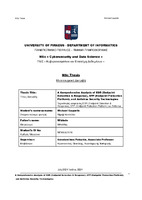A comprehensive analysis of EDR (Endpoint Detection & Response), EPP (Endpoint Protection Platform), and antivirus security technologies
Τεχνολογίες ασφαλείας EDR (Endpoint Detection & Response), EPP (Endpoint Protection Platform) και antivirus

Master Thesis
Συγγραφέας
Cappello, Michael
Καππέλλο, Μιχαήλ
Ημερομηνία
2024-07Επιβλέπων
Patsakis, ConstantinosΠατσάκης, Κωνσταντίνος
Προβολή/
Λέξεις κλειδιά
EDR ; Antivirus ; EPP ; Endpoint Detection & Response ; Endpoint Protection Platform ; CALDERAΠερίληψη
Στη σημερινή ψηφιακή εποχή, όπου οι κυβερνοαπειλές και οι παραβιάσεις δεδομένων αποτελούν σημαντικούς κινδύνους, η ανάγκη για ισχυρές λύσεις ασφάλειας τελικών σημείων είναι επιτακτική. Αυτή η διπλωματική εργασία εξετάζει τις λεπτομέρειες τριών σημαντικών τεχνολογιών στον τομέα της ασφάλειας τελικών σημείων: των Συστημάτων Ανίχνευσης και Απόκρισης Τελικών Σημείων (EDR), των Πλατφορμών Προστασίας Τελικών Σημείων (EPP) και των παραδοσιακών λύσεων Αντιϊών. Μέσω μιας ολοκληρωμένης ανάλυσης, αυτή η έρευνα στοχεύει να διαφωτίσει τις λειτουργίες, τα πλεονεκτήματα, τους περιορισμούς και τους εξελισσόμενους ρόλους αυτών των τεχνολογιών στην προστασία των τελικών σημείων από μια πληθώρα κυβερνοαπειλών.
Η εμφάνιση εξελιγμένων κυβερνοεπιθέσεων έχει καταστήσει αναγκαία μια αλλαγή παραδείγματος στις στρατηγικές ασφάλειας τελικών σημείων. Το EDR αναδεικνύεται ως μια προληπτική προσέγγιση που επικεντρώνεται στη συνεχή παρακολούθηση, την ανίχνευση απειλών και την ταχεία απόκριση για την αποτροπή πιθανών ζημιών. Η ικανότητά του να παρέχει σε πραγματικό χρόνο ορατότητα στις δραστηριότητες των τελικών σημείων, σε συνδυασμό με προχωρημένες αναλύσεις και αλγόριθμους μηχανικής μάθησης, ενδυναμώνει τους οργανισμούς να ανιχνεύουν και να εξουδετερώνουν αποτελεσματικά τις απειλές.
Συμπληρωματικά στο EDR, η πλατφόρμα EPP συνδυάζει διάφορες λειτουργίες ασφάλειας σε μία ενιαία πλατφόρμα, προσφέροντας μια ολιστική προσέγγιση στην προστασία των τελικών σημείων. Με την ενσωμάτωση αντιϊικών, αντι-κακόβουλου λογισμικού, τείχους προστασίας και άλλων χαρακτηριστικών ασφάλειας, η EPP ενισχύει τα τελικά σημεία έναντι ενός ευρέος φάσματος απειλών, από γνωστά κακόβουλα λογισμικά μέχρι νέες εκμεταλλεύσεις μηδενικής ημέρας. Επιπλέον, οι δυνατότητες κεντρικής διαχείρισης και επιβολής πολιτικών επιτρέπουν στους διαχειριστές συστημάτων να ελέγχουν και να παρακολουθούν αποδοτικά την ασφάλεια των τελικών σημείων σε όλο το δίκτυο.
Η εργασία αυτή διερευνά επίσης τον ρόλο των παραδοσιακών λύσεων αντιϊών, αναλύοντας την αποτελεσματικότητά τους και τη θέση τους στην τρέχουσα στρατηγική ασφάλειας των οργανισμών. Ενώ οι αντιϊικές λύσεις συνεχίζουν να αποτελούν βασικό συστατικό της προστασίας τελικών σημείων, η ενσωμάτωσή τους με πιο σύγχρονες τεχνολογίες EDR και EPP είναι ζωτικής σημασίας για την επίτευξη μιας ολοκληρωμένης άμυνας.
Μέσω συγκριτικής αξιολόγησης, μελέτης περιπτώσεων και πρακτικών δοκιμών, αυτή η διπλωματική εργασία προσφέρει μια εις βάθος κατανόηση των διαφόρων προσεγγίσεων στην ασφάλεια των τελικών σημείων, προσδιορίζοντας τις βέλτιστες πρακτικές και τις μελλοντικές κατευθύνσεις για την προστασία των πληροφοριακών συστημάτων από συνεχώς εξελισσόμενες κυβερνοαπειλές.


